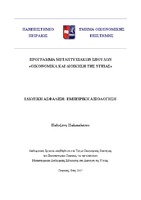Ιδιωτική ασφάλιση: εμπειρική αξιολόγηση
Private insurance: empirical assessment

Προβολή/
Λέξεις κλειδιά
Ασφάλιση ; Ιδιωτική ασφάλιση ; Κίνδυνος ; Ασφαλιστήριο συμβόλαιο ; Σύστημα υγείας ; Insurance ; Private insurance ; Health system ; Risk ; Insurance contractΠερίληψη
Η εν λόγω εργασία έχει δύο σκέλη: το θεωρητικό και το ερευνητικό. Στο θεωρητικό μέρος γίνεται ανάλυση της βιβλιογραφικής επισκόπησης της έρευνας και στο ερευνητικό μέρος παρουσιάζονται και αναλύονται τα δεδομένα εμπειρικώς. Αναλυτικά, στο κεφάλαιο 1 παρουσιάζεται η εισαγωγή της διπλωματικής εργασίας. Στο πρώτο κεφάλαιο που είναι και το εισαγωγικό αναλύεται με αναγωγική μέθοδο και παρουσιάζονται εν συντομία τα ευρωπαϊκά συστήματα υγείας και εν κατακλείδι το σύστημα υγείας των ΗΠΑ το οποίο προσδίδει εντόνως έμφαση στην ιδιωτική ασφάλιση έναντι της κοινωνικής. Στο κεφάλαιο 2 παρουσιάζεται η ανασκόπηση της βιβλιογραφίας, στο συγκεκριμένο κεφάλαιο μελετώνται επιστημονικά άρθρα σχετιζόμενα με την ιδιωτική ασφάλιση. Η ιδιωτική ασφάλιση, αν και θεωρείται πολύ σημαντική, στα περισσότερα κράτη λειτουργεί ως συμπληρωματική και οι αρθρογράφοι με τη μελέτη τους στοχεύουν στην ενημέρωση περί της ιδιωτικής ασφάλισης. Τα επιλεγόμενα άρθρα σκοπεύουν να δώσουν μια γενική αλλά παράλληλα και στοχευμένη εικόνα για την ιδιωτική ασφάλιση. Στο τρίτο κεφάλαιο εξετάζονται ορισμοί για την ιδιωτική ασφάλιση, την ασφάλιση και τον κίνδυνο. Γίνεται αναλυτική και εμπεριστατωμένη εξέταση για το θέμα της διπλωματικής εργασίας «ιδιωτική ασφάλιση: εμπειρική αξιολόγηση». Γίνεται μία μικρή αναφορά στον κίνδυνο και στην ασφάλιση που συνδέονται άρρηκτα με την ιδιωτική ασφάλιση. Πιο συγκεκριμένα γίνεται μια παρουσίαση βασικών εννοιών σχετικών με την ιδιωτική ασφάλιση για την καλύτερη κατανόηση της εργασίας. Επίσης δίνεται ο ορισμός της ασφάλισης, του κινδύνου, της ιδιωτικής ασφάλισης. Εν συνεχεία καταγράφονται εντός του κεφαλαίου οι βασικές νομικές αρχές, τα κύρια χαρακτηριστικά της ιδιωτικής ασφάλισης, καθώς επίσης παρατίθεται αναφορά στο ασφαλιστήριο συμβόλαιο. Τα είδη ιδιωτικής ασφάλισης - ασφαλίσεις ζημιών και ασφαλίσεις ζωής απαριθμούνται λεπτομερώς, όπως και οι κατηγορίες ιδιωτικής ασφάλισης. Το κεφάλαιο κλείνει με την ανάλυση του περιεχομένου της οργάνωσης της ασφαλιστικής αγοράς, της διάκριση της ασφαλιστικής αγοράς, των οφελών της ιδιωτικής ασφάλισης για την κοινωνία και των προοπτικών ιδιωτικής ασφάλισης στην Ελλάδα. Στο δεύτερο μέρος, στο κεφάλαιο 4 παρατίθενται τα εμπειρικά δεδομένα και η εμπειρική ανάλυση. Τα δεδομένα που χρησιμοποιούνται είναι δευτερογενή και προέρχονται από την πηγή U.S. Census Bureau, Current Population Survey, 2015 and 2016 Annual Social and Economic Supplements. Παρουσιάζονται μεταβλητές που αφορούν την οικογενειακή κατάσταση, τη διαμονή, την καταγωγή και τη γενέτειρα περιοχή όπως αυτές εκφράζονται σε απόλυτα νούμερα για τα έτη 2013, 2014 και 2015. Επίσης παρουσιάζεται η κατανομή των ποσοστών των μεταβλητών που αφορούν την οικογενειακή κατάσταση, τη διαμονή, την καταγωγή και τη γενέτειρα περιοχή σε σχέση με την ιδιωτική ασφάλιση για τα έτη 2013, 2014 και 2015. Στη συνέχεια καταγράφεται η σύγκριση των ποσοστών των μεταβλητών που αφορούν την οικογενειακή κατάσταση, τη διαμονή, την καταγωγή και τη γενέτειρα περιοχή μεταξύ αυτών που έχουν ιδιωτική ασφάλιση και αυτών που έχουν μία άλλη οποιαδήποτε ασφάλιση, για τα έτη 2013, 2014 και 2015. Επίσης γίνεται καταγραφή της σύγκρισης των ποσοστών των μεταβλητών που αφορούν την οικογενειακή κατάσταση, τη διαμονή, την καταγωγή και τη γενέτειρα περιοχή μεταξύ αυτών που έχουν ιδιωτική ασφάλιση και αυτών που έχουν κρατική ασφάλιση, για τα έτη 2013, 2014 και 2015. Τέλος το κεφάλαιο των δεδομένων κλείνει με τη σύγκριση των ποσοστών των μεταβλητών που αφορούν την οικογενειακή κατάσταση, τη διαμονή, την καταγωγή και τη γενέτειρα περιοχή μεταξύ αυτών που έχουν ιδιωτική ασφάλιση και αυτών που είναι ανασφάλιστοι, για τα έτη 2013, 2014 και 2015 και την κατανομή των ποσοστών των μεταβλητών που αφορούν την ασφάλιση για τα έτη 2013, 2014 και 2015. Η διπλωματική εργασία κλείνει με το κεφάλαιο 5, τα συμπεράσματα.


